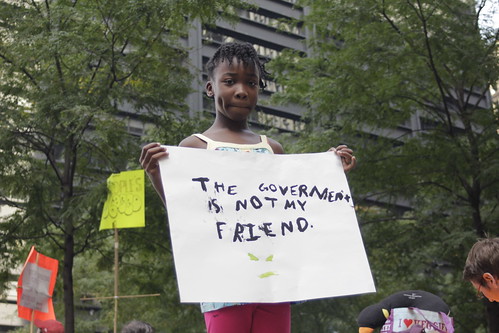Hard to ignore the news media around Occupy Wall Street or miss the tents pitched in Burnside Park. Teaching children what’s happening locally and the greater world beyond is important and helps kids to develop their sense of place and responsibility to our community. But politics are complicated, even for adults. How do we help children understand what it is and why things happen? Make it relevant to them and share your values and opinions around the current event. At Kidoinfo, we share many voices and opinions of parents. Today, contributing writer, Jessica Holden Sherwood explains what Occupy means in a simple way for kids to understand. – Anisa
 I am a sociologist, a mother, and a supporter of Occupy Providence and its larger movement. My kids are ages seven and nine. Here are some suggestions if you, like me, want to explain the curious sprouting of tents downtown and on TV.
I am a sociologist, a mother, and a supporter of Occupy Providence and its larger movement. My kids are ages seven and nine. Here are some suggestions if you, like me, want to explain the curious sprouting of tents downtown and on TV.
INTRODUCTORY LEVEL: INEQUALITY
Even preschoolers could understand this: imagine that all the people in the country were just ten people, and that all the money in the country was ten cookies. The United States has gotten to the point where one of those people has seven cookies! The other nine of us are left to fight over just three cookies. (Grownup note: you can check the Sources.)
This doesn’t seem fair, and people have started to complain about it. We’d like to change some rules. The one with seven cookies is not a bad guy, and we don’t want to hurt him. But it wouldn’t hurt him at all to share more, and it would be more kind and fair to everyone else.
INTERMEDIATE LEVEL: CAMPAIGN FINANCE
How did the rules evolve to the point where one guy could have seven cookies? That’s a tricky one, and it’s beyond what’s usually covered in social studies classes. But here’s what I have said to my kids: imagine that Ellie is running for governor, and Abigail is a business owner. It costs a lot of money to run for governor, between the signs and the staff and especially the TV commercials. Imagine Abigail donates a million dollars to Ellie’s campaign and she gets elected. Then when Abigail wants a law passed or changed, and she visits Ellie to persuade her, Ellie will probably listen! This is especially true if Ellie and Abigail also have additional corporate, philanthropic, or social ties, which is often the case.
ADVANCED LEVEL: GOVERNMENT BUDGETS
We pay taxes to governments, so that governments can do all sorts of things. Your kids may already be aware of this if you’ve had to explain a trip to an accountant or something.

If you do nothing but complain about taxes, I encourage you to reconsider. Our little state recently made the New York Times with some bad news: municipalities are facing cuts to programs for children and the elderly, bus service, and even public libraries due to budget crises.
Too often, discussion about government budgets is only a discussion about spending. But as I’ve learned in a state budget workshop, we also have to talk about what the government is bringing in. Let’s revisit Abigail the businesswoman and Ellie the politician. The Abigails of our state and country have persuaded the politicians, over the decades, to enact all sorts of tax breaks and cuts. Now, corporations are chipping in a much smaller proportion of government revenues than they did fifty years ago.
Our state and our country are not broke. We have to talk not only about cutting spending, but also about raising revenue.
Okay kids, story time is over. Maybe if the weather is good on Sunday, we can make a field trip to “Occu-Stock,” a music and art festival in India Point Park. Look for me there with the real Abigail and Ellie.
Jessica Holden Sherwood, Ph.D., is Executive Officer of Sociologists for Women in Society, and the author of Wealth, Whiteness, and the Matrix of Privilege: The View from the Country Club. She lives on the East Side of Providence with her husband and two daughters, who may or may not have futures in business and politics.










Thanks for this, Jessica. Well said. I just had this conversation with my grandson and didn’t come close to being this clear! I think the cookie analogy could open the eyes of some adults too. Must add – kudos to Mayor Tavares and the City for their respectful response to the Occupiers.
This is so well put, and useful for everyone with kids. Thank you for writing this.
Check out the Face Book page – Teach Occupy Wall Street. They’re becoming a resource sharing page for curriculum on OWS. So exciting.
Thank you for this!